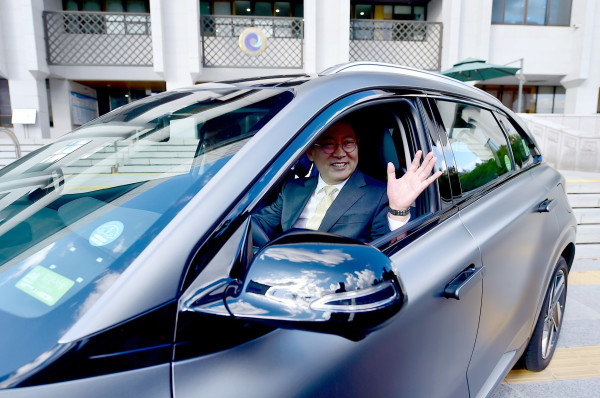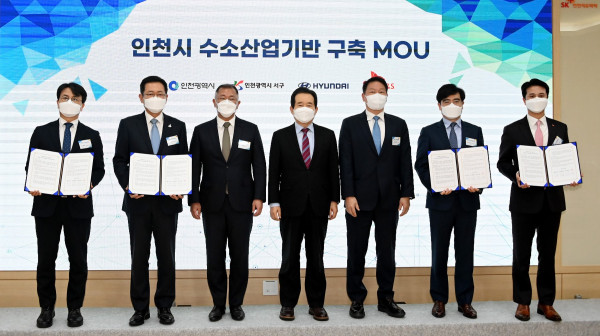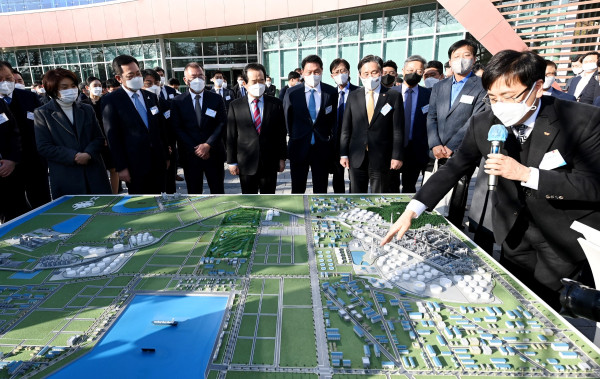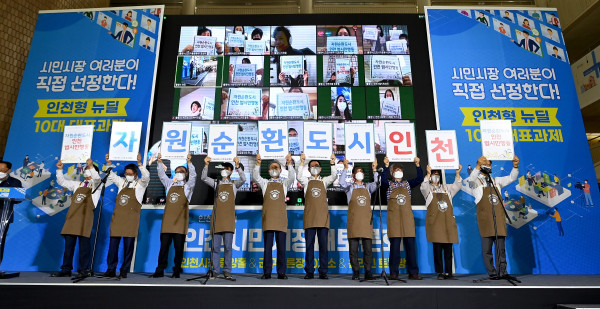Joins the Powering Past Coal Alliance, exploresthe expansion of hydrogen-powered mobility solutions and the reduction ofgreenhouse gases
Incheon recently rolled up its sleeves to take amore aggressive stance in building an economy based on hydrogen, which iswidely regarded as an eco-friendly future energy source. It is accelerating itsplans to make the city carbon neutral with more green buildings and cleanfactories, and by creating urban forests capable of absorbing carbon.

▲ Incheon is taking a more aggressive stance inbuilding an economy based on hydrogen, which is widely regarded as aneco-friendly future energy source. Incheon Mayor Park Namchoon on October 18,2018, testing Hyundai’s hydrogen electric vehicle “Nexo.”
Incheon declares itself a leader in the hydrogenindustry, accelerates transition to eco-friendly energy
To transition from a fossil fuel-driven society to an eco-friendlyenergy-driven society at a faster pace, Incheon joined hands with the corporatesector and declared itself a “leading hydrogen city.”
On March 2, the Incheon Metropolitan Government, Seo-gu Office,Hyundai Motor Company, and SK E&S signed an “MOU on mutual cooperation forthe establishment of the hydrogen industry.” The Hydrogen Economy Committee(chaired by Prime Minister Chung Sye-kyun), the Korean government’s controltower for hydrogen economy initiatives, joined the agreement as well.
Under its newest MOU, Incheon will take the lead in building abio/by-product hydrogen production cluster, and explore ways to offer financialand administrative support for initiatives such as transitioning to a hydrogenvehicles system and building the required infrastructure. Meanwhile, Seo-guwill look to build a hydrogen industry base, improve the environment, andbolster safety. In order to contribute to the expansion of the hydrogen economy, Hyundai MotorCompany plans to promote the hydrogen car industry, supply hydrogen-poweredcars, and actively participate in Incheon’s project to establish a foundationfor its bio/by-product hydrogen production cluster. SK E&S plans toparticipate in the construction of the bio/by-product hydrogen productioncluster in Incheon, and invest in building the infrastructure facilities forliquefied hydrogen in connection with the cluster project.
Moving forward, Incheon will do its best to builda bio/by-product hydrogen production cluster that utilizes bio-hydrogen fromlandfills in the metropolitan area, along with by-product hydrogen, and expandthe supply of hydrogen-powered mobility solutions.
With large corporations joining Incheon’s plan tobuild a hydrogen production cluster, the project is expected to bringsignificant economic benefits, such as job creation and development of relatedindustries, to the city.
Mayor Park Namchoon said, “In order to respond to climate changeand become a carbon-neutral city, the supply of hydrogen energy is a necessity,not a luxury. Using optimized production facilities for hydrogen, we willdevelop Incheon’s ecosystem for hydrogen production moving forward. Also, basedon scientific research for hydrogen safety, we plan on building a consensuswith our citizens and make the Incheon’s hydrogen production cluster a primerfor Korea’s hydrogen economy.”

▲ On March 2, Incheon hosted the “3rd HydrogenEconomic Committee Meeting” and a signing ceremony for the “MOU on mutual cooperationfor the establishment of the hydrogen industry” at SK Incheon Petrochemicals inSeo-gu, Incheon. From the left: Lee Jae-hyeon (District Mayor, Seo-gu Office),Park Namchoon (Mayor, Incheon Metropolitan City Government), Chung Eui-sun(President, Hyundai Motor Group), Chung Sye-kyun (Prime Minister), Chey Tae-won(President, SK Group), Gong Young-woon (President, Hyundai Motor Corporation),Choo Hyeongwook (President, SK E&S)

▲ Attendees at the MOU signing ceremony listeningto an brief on the planned location of the SK Hydrogen Liquefaction Plantproject.
Incheon to reducegreenhouse gas 32.6% by 2030
To reduce 32.6% of all greenhouse gases generated by buildings in itsjurisdiction by 2030, Incheon plans to establish and execute its “Detailed ActionPlan for Green Buildings” developed specifically to promote the construction ofgreen buildings.
A “Green Building” refers to a structure designed to minimizegreenhouse gas emissions with eco-friendly designs and construction methods byapplying energy efficiency and using new and renewable energy technologies.
Green buildings are significant in creating a sustainable futureas they can prevent environmental pollution by conserving resources, improveair quality by reducing fuel consumption, and reduce the emission of greenhousegases such as carbon dioxide. In terms of greenhouse gas emissions by sector in Korea, as of 2017, buildingsemitted 24.6% all greenhouse gases in Korea (industrial emissions were 55.3%),making them a serious source of total greenhouse gases. As for Incheon, out ofits total greenhouse gas emissions of 740 million TCO2eq, buildings accountedfor 176 million TCO2eq, representing a similar figure to the national averageat about 25% of all greenhouse gas emissions.
Thus, the green buildings initiative can work as a key projectthat accelerates Incheon’s transition to a carbon neutral city. In particular,the green buildings initiative is the most realistic plan as it is very closelyrelated to the daily lives of people, and a core initiative of the centralgovernment’s Green New Deal that must be initiated as quickly as possible.
The “Detailed Action Plan for Green Buildings” projectestablished by the city to promote green buildings is a five-pronged plan - a)establish an institutional basis; b) build green buildings tailored to Incheon;c) improve the green environment; d) promote a culture of green buildings; ande) promote the initiative to the public.
Incheon will establish the “Incheon Metropolitan City GreenBuilding Design Standards” within this year, and standards such as eco-friendlyand energy performance will be applied to buildings subject to architecturaldeliberations (e.g. new construction and renovation) to lay the institutionalfoundation required for the green buildings project.
Then, Incheon plans to reflect its regional characteristics toimplement a zero-energy construction system that utilizes renewable energy suchas recycled rainwater and hydrogen fuel cells, and establish guidelines fortransforming old buildings into green buildings tailored to Incheon’senvironment. Starting this year, Incheon is planning to find new projects itcan realistically undertake, and to pursue those project after securing thenecessary budget during the second half of the year.
Third, Incheon plans to create a green environment by remodelingpublic buildings mainly used by marginalized segments of its population intogreen buildings, by building zero-energy “My House (Incheon’s permanent rentalhousing program)” buildings, and by providing various incentives to improve theenergy performance of buildings. In 2020, Incheon broke ground on 22 greenremodeling sites, including national and public daycare centers. The goal is tocomplete 600 units by 2024.
Fourth, Incheon will provide energy experience-related booths atthe Incheon Architecture Festival (scheduled in October), and host greenbuilding competitions to identify creative future ideas for green architecturetailored to its citizens and reflect them in policies to promote a culture ofgreen architecture culture.
Lastly, Incheon plans to promote the popularization of greenbuildings and spread awareness by producing brochures on green buildings andoffering various green education programs.

▲ At the “2020 Incheon Citizen’s Market GrandDebate” held at the central hall of the Metropolitan City Hall on October 13,2020, Incheon announced its own version of the Green New Deal and helped itscitizens give various presentations on the circulation of resources.
Incheon promoting its own version of a Green New Deal to takethe leap as an “eco-friendly” city
Incheon is actively responding to environmental issues bypromoting its “Incheon Green New Deal,” which focuses on major transformationsto resource recycling policies and the reduction of carbon emissions.
Key projects include an eco-friendly landfill (Incheon EcoLand), which will get under way when the metropolitan area landfills close in2025, an urban forest that absorbs greenhouse gases, and the supply ofeco-friendly cars.
This year, Incheon is ready to create an urban forest equivalentto the size of 13 football pitches. Incheon’s new urban forests will be builtacross 45 different locations and cover 105,000m2 in the form of a forest alongthe 3rd Gyeongin Expressway designed to block micro dust, urban wind forests,and indoor smart gardens.
Also, by 2022, Incheon will boost its supply of eco-friendlyvehicles, including 22,000 electric vehicles and 2500 hydrogen fuel cellvehicles. Overall, the Incheon Green New Deal will welcome approximately 60,000eco-friendly cars (50,000 electric cars and 10,000 hydrogen-powered cars) and3,000 green buildings to its jurisdiction.
The number of “Clean Factories” (factories in industrialcomplexes converted into eco-friendly factories using cutting-edge greentechnology) will also go from 15 in 2020 to 90 in 2025.
Regarding the new eco-friendly landfill site, Mayor ParkNamchoon announced Yeongheungdo Islandin Ongjin-gun as the final candidate for Incheon Eco Land. He said, “We plan tomake Yeongheungdo a central part of our eco-friendly city and an engine thatdrives Korea into an eco-friendly future.”
Incheon Eco Land will be built and operated using eco-friendlytechniques rather than the current direct landfill methods, which means it willdo no environmental damage to the surrounding area. According to estimates,that only about eight 20-ton trucks will be required per day by landfillingonly the residues and other non-combustible remnants left behind afterrecycling the incinerated ash from the resource recycling center. Meanwhile, Incheon joined the Powering Past Coal Alliance (PPCA) in Novemberlast year in line with the push by governments and the international communityto actively respond to the climate crisis and transition to sustainable,eco-friendly energy systems.
